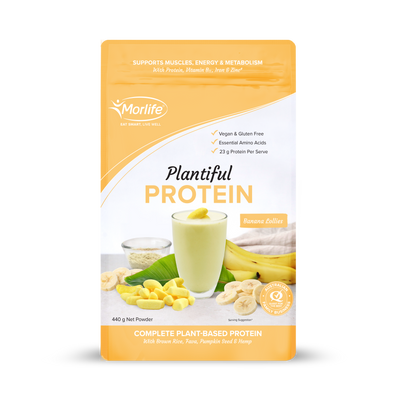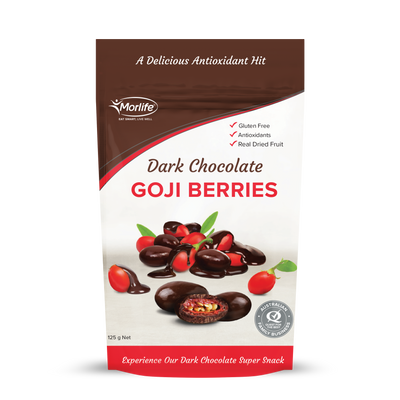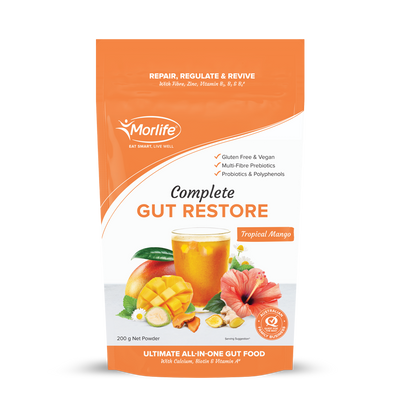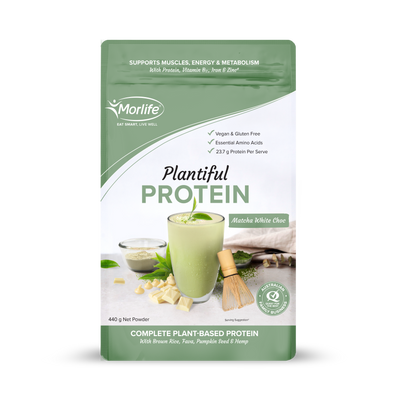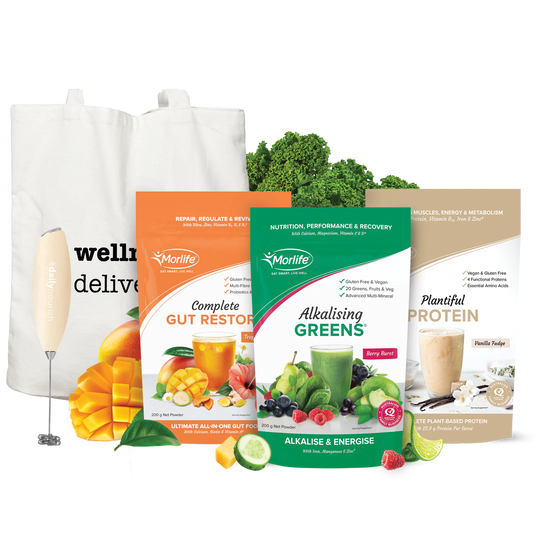We're Bananas About Gut Health - Our Top 7 Tips

The relationship between gut health and the immune system is fascinating and far more interrelated than we may realise. A lot of it comes back to our microbiome. Our microbiome consists of microbes (bacteria, fungi, protozoa and viruses) that are both helpful and potentially harmful and they live on/inside the human body (think good and bad bugs). When the microbiome is spoken about, it is often only thought of as the bugs in our gut, which is where most of them live. However in actual fact, we have various microbiome communities living in many different areas of our body, like on our skin or in our nose, it’s just that the majority live in our gastrointestinal system. Remarkably, so does about 70-80% of the body’s immune system cells, and that’s no coincidence.
Our immune system and our gut microbiome are vitally interconnected and incredible when working in harmony. Our digestive system is often the first place our immune cells are introduced to triggers and potential invaders, think of it as the gatekeeper and trainer to your immune system. Our intestinal epithelial cells (the cells that make up the lining of the gut) act as a barrier to prevent unwanted invaders from entering our system and our gut microbiome can help teach our immune T-cells (white blood cells essential to immunity) to distinguish foreign entities from our own cells. Pretty impressive stuff if you ask us!
When our immune system and gut microbiome are in a state of wellness, everything runs smoothly. Our gut signals for healthy immune function and appropriate immune responses, and our immune system helps to keep our microbiome flourishing with the right bugs. This means the body can respond to germs, ignore harmless bacteria and recognise our cells, preventing an incorrect autoimmune response. This is exactly the kind of state you should strive to maintain.
It is now well recognised that incorrect communication between intestinal bacteria and the immune cells can contribute to disease as well as low or overactive immune responses. In other words, not a great outcome.
So, when we aren’t feeding our gut bacteria the right foods or are exposed to bacteria-stripping factors like antibiotics, we find ourselves out of balance which can snowball into reduced immunity or overreactive immunity - both are equally bad. Some signs that can point to an imbalanced gut can be are pretty obvious, like diarrhoea, excessive bloating, flatulence, or abdominal pain, but some less obvious signs could also be pointing to your gut, for instance, skin issues, intolerances and allergies, lowered immunity, fatigue, mental disorders, autoimmune conditions, sugar cravings, chronic inflammation and even weight fluctuations.
Such a close working relationship tells us that we need to make sure we are looking after both, hand in hand, so whilst immune-supporting ingredients are key to the immune system doing its job right, we need to feed our gut right too, to make sure it’s getting the right signals and training from the gut.
Since we're all looking to ditch the downtime and keep on top of our game this winter, peep our latest blog for our top 7 naturopath tips on how to show a little love and support for your gut and immune system!
- NOURISH YOUR GUT WITH PREBIOTICS AND POLYPHENOLS
Prebiotic is another big trendy word at the moment. But what does it mean? A prebiotic is: “a selectively fermented ingredient that allows specific changes, both in the composition and/or activity in the gastrointestinal microflora that confers benefits upon the host's well-being and health.”
A prebiotic resists digestion in the human intestine and reaches the colon where it can be fermented by the good gut microflora. Although all prebiotics are fibre, not all fibre is a prebiotic, and different fibres have been found to have different positive impacts on gut health and our microbiome.
This is why it is so important to have a wide range of different fibre sources in your diet. One reason for the different benefits is the fermentation speed, which is relative to the feeding of your bacteria. Some fibres ferment quickly within the gut, whereas others are more slowly fermented, which allows you to feed the microbiome throughout the whole gastrointestinal tract when consuming a range of fibres.
Examples of some of our favourite prebiotics are:
- Partially Hydrolysed Guar Gum or PHGG which is an extremely slow fermenting fibre renowned to cause less bloating and discomfort than other prebiotics as well as being a great fibre for people with both constipation or diarrhoea.
- Apple Pectin, pectin being the main fibre in apples, is a great prebiotic but it is also a soluble fibre that works to draw water into your gut, which softens your stools and supports regular bowel movements. Maybe the person who said “an apple a day keeps the doctor away” was onto something?
- Green Banana Resistant Starch is like the name suggests, a starch that resists digestion made from green bananas, which has been shown to have a wide range of benefits to the microbiome and body in general.
- Inulin and FOS are examples of fast fermenting fibres, which is why some people have more bloating when consuming products that contain them – but remember that the fast fermentation is beneficial to the feeding of our microbiome at the higher levels of our gut, so if you’re introducing a fast fermenting fibre to your diet, the goal is low and slow to give your body a chance to adjust. Our Inulin Plus actually contains both fibres, making it a winning combo for your gut.
Polyphenols which are potent antioxidants also have a prebiotic-like effect in feeding our gut and promoting a healthy microbiome. This also helps us to unlock the benefits of these antioxidants as they are only able to be absorbed by us after fermentation. These polyphenols are often the colours you see in different fruits and vegetables, which is why you need to eat the rainbow and get a lot of different colours in your diet.
One thing is clear, we all benefit from having prebiotics and polyphenols as they are the food that will feed our good gut bacteria! Remember, prebiotics are the food for good gut bacteria, and probiotics are the good bacteria.
- DRINK PLENTY OF WATER
We all know how important it is to stay hydrated - drinking between 1.5 - 2 litres of water a day helps kidney function and flushes out unwanted toxins. Water also allows the body to move nutrients around more easily, decreases constipation and helps to ease waste removal.
If you find it difficult to drink enough water, herbal tea can be a great choice as it can provide you with extra benefits like polyphenols whilst tasting great. (Try our Echinacea Boost which contains not only echinacea but also elderberry which is a powerful pairing).
- STRIVE TO IMPROVE YOUR DIET
Have you heard that good gut bacteria feed on good food and bad gut bacteria feed on bad food? Well, this is true! Having a diet full of fatty foods, sugary products, alcohol, etc. will most likely feed bad gut bacteria and they will start multiplying themselves, outnumbering the number of good gut bacteria. This bad bacteria is so smart it can even trigger your body to crave these naughtier foods, leading you to consume them and continue feeding this bad bacteria! So, it's important to aim for a diet rich in fruits and vegetables (and fibre) whilst avoiding refined sugars and highly processed foods to ensure we’re feeding our good guys so they can overpower the baddies.
- MANAGE YOUR STRESS
Your body can’t tell the difference between emotional/mental stress and physical stress, so it triggers your fight-or-flight response. This means digestion will slow or stop altogether so that your body can divert energy to face the perceived threat a.k.a. the tiger it thinks you’re running from.
When we're stressed, our immune system's ability to fight off pathogens is also reduced, making us more susceptible to infections. Meditation, mindfulness, deep breathing, yoga and pilates are some great tools to help you break the hold stress has on both your body and your life.
- EXERCISE
Regular, moderate exercise can boost your immunity by decreasing stress, flushing out toxins from the body and improving sleep. Simply going for a 30-minute walk can do wonders for your mind, body and soul, or try yoga or pilates as a gentle way to get your body moving and help you chip away at stress at the same time.
- SLEEP
While more sleep won’t necessarily prevent you from getting sick, lack of it could adversely affect your immune system and leave you run down. While we sleep, our bodies produce key proteins (cytokines) that help fight infections and inflammation. If we don’t get enough sleep, our bodies are unable to produce as many of these bad boys which means increased chances of getting sick. Try to aim for 7-9 hours of sleep per night.
- START SMALL AND MAKE SMART CHOICES
It’s extremely common to try and make a million changes at once, and that tends to blow up in our face, so start small and make smart choices & changes to your day-to-day. Any step in the right direction is better than none, so don’t be hard on yourself and be proud of anything you do achieve, even if it’s just the littlest of things.
For simple solutions to support you through this winter, and all seasons really, we have the perfect pair to take a two-pronged and simple approach to wellness and immunity:
- Berry Active Immune is a comprehensive blend featuring a broad range of essential nutrients and herbal extracts, specific to your immune system, designed to support your wellness whatever the weather; and
- Complete Gut Restore is the perfect all-in-one gut food combining prebiotics, polyphenols, and probiotics with soothing herbs to promote a happier tummy as well as optimize gut function and regularity.

